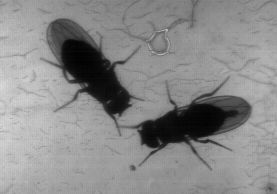Extracting high-speed insect behavior at micrometer precision
Spring 2012
Master Diploma
Project: 00242

Insects exhibit robust terrestrial locomotion while relying on a relatively small and simple controller, the nervous system. This makes it an ideal source of bio-inspiration for robust legged walking robots. However, owing to the tiny size and rapid kinematics of most insect behavior we cannot model this behavior precisely without advanced computer vision approaches.
The main objective of this project is to develop an algorithm for extracting the leg positions of freely walking flies in high-speed, high-resolution movies. Ultimately, the goal is to perform a quantitative analysis of the means by which flies use dynamic gaits to achieve optimal avoidance of other flies during collective behavior. This new knowledge will provide inspiration for efficient and robust robotic locomotion as well as a substrate for further studies into neural control of gait in animals.
A preliminary breakdown of the project follows:
The main objective of this project is to develop an algorithm for extracting the leg positions of freely walking flies in high-speed, high-resolution movies. Ultimately, the goal is to perform a quantitative analysis of the means by which flies use dynamic gaits to achieve optimal avoidance of other flies during collective behavior. This new knowledge will provide inspiration for efficient and robust robotic locomotion as well as a substrate for further studies into neural control of gait in animals.
A preliminary breakdown of the project follows:
- Propose a suitable active-contour model. In particular, a) search the literature for mathematical models of leg joints in insects and b) investigate whether these can be used to constrain active contours for better fitting results.
- Build upon existing code developed at the Biomedical Imaging Group to fit the model to fruit flies in still images.
- Incorporate the procedure into a complete tracking framework for processing video sequences.
- Extract biologically relevant data and, if possible, publish the results.
The project will primarily be supervised at the Biomedical Imaging Group (EPFL), in close interaction with the Laboratory of Intelligent Systems (EPFL) and in collaboration with the Benton Lab (UNIL).
- Supervisors
- Cédric Vonesch, cedric.vonesch@epfl.ch, 021 693 51 43, BM 4.141
- Michael Unser, michael.unser@epfl.ch, 021 693 51 75, BM 4.136